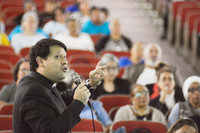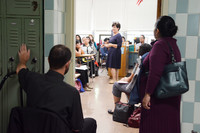

Auxiliary Bishop Gerald T. Walsh said catechists and others attending the opening Mass at the annual Catechetical Forum should be “instruments of bringing people together as God’s family and nurturing them.”
Bishop Walsh, in his homily delivered in English and Spanish to the 800 people attending the Catechetical Forum at Cardinal Spellman High School in the Bronx Oct. 14, also encouraged the catechists to listen and observe “with the eyes and ears of faith,” so that they can learn how best “our teaching can be applied to” those whom they are teaching.
Catechists and others committed to catechetical ministry also must be people of prayer. “Witness Jesus where we are, and get close to Him in prayer,” said the bishop, who is vicar for clergy in the archdiocese.
Bishop Walsh said, “You are called to be among the leaders in the time of the New Evangelization” called for by Pope Francis, and his two predecessors, Pope Benedict XVI and St. Pope John Paul II.
The bishop’s homily was in keeping with the forum’s theme, “Called to Be a Sign of God’s Presence.”
Sister Joan Curtin, C.N.D., the director of the archdiocesan Catechetical Office, in words of welcome near the end of the Mass, told the catechists that they “make a tremendous difference.”
“You are the best, 100,000 thanks for all you do for God’s people,” she said.
Also participating was Ela Milewska, executive director of the Department of Youth Faith Formation, which is comprised of the Catechetical Office and the Office of Youth Ministry.
The Catechetical Forum’s second daylong session will be held at Sacred Heart parish in Monroe this Saturday, Oct. 28, beginning with Mass at 8:45 a.m. Auxiliary Bishop Dominick J. Lagonegro is scheduled to be the principal celebrant.
At Cardinal Spellman, Father Dempsey Rosales Acosta, chairman of theology at the University of St. Thomas in Houston, delivered the keynote address, “Paul, a Christian Sign in a Multicultural Setting,” in Spanish and English.
Speaking with CNY, Father Rosales Acosta said the multilingual, multicultural environment of New York City today is not unlike what Paul faced during his missionary experiences with unfamiliar and sometimes hostile audiences.
Paul used his ability with different languages to create “bridges of communication,” Father Rosales Acosta said. The ability to build bridges with the people of other cultures and languages will be increasingly important in the U.S. Church, which now has 6,300 multicultural parishes, a number that is on the rise, he said.
Catholic lay evangelist Tony Bellizzi, in his workshop, “Bring Them Home,” said the number one problem identified by older Catholics at the parish missions and retreats he leads is the concern they express about their children and grandchildren leaving the Church.
Those who have left do not have a problem with Jesus, but they do have a problem, or more accurately a set of problems, with the Church. “They leave because they have not had an encounter with Jesus in the Church,” Bellizzi said.
Bellizzi suggested that a good course to take with Catholics who no longer practice their faith is to forget about the hard-sell approach. It’s better to ask good questions and try to understand where they are coming from than it is to force them to come to Mass on a given Sunday. That may be the eventual goal, but it should not be the first step, he said.
A better approach would be to remember that “you don’t need a resolution in this moment,” so Bellizzi advocated praying for the fallen away to come home to Jesus. He also said all Catholics should look at their own parishes and see that they do their part to make them “vibrant places where the love of God exists.”
Barbara Lennihan, a third-year catechist at St. Clare of Assisi parish in the Bronx, spoke with CNY. She teaches second-graders who are preparing to receive their First Holy Communion in the spring. “I do love being with the children, especially the young ones, helping them to learn about their religion,” she said.
Noting Bellizzi’s workshop, which she had just attended, Ms. Lennihan said, “People are falling away from religion when we need it more than ever.”